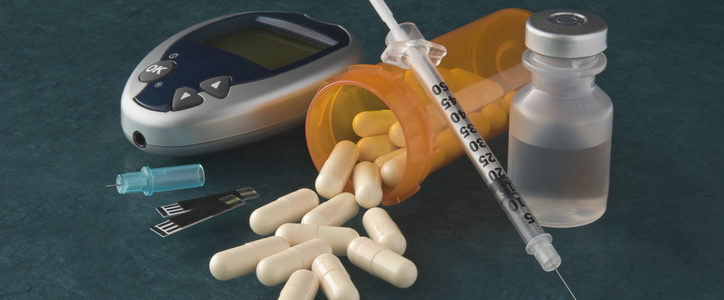
Attention Seniors! Diabetes Drug CAUSES Heart Attack
There are all kinds of reasons why you don’t ever want to develop type 2 diabetes.
If the possibility of going blind or having permanent nerve damage don’t scare you… the meds your mainstream doc will use to treat the disease certainly should.
You see, most diabetes drugs come with serious side effects like amputations and stomach issues.
But that’s not the worst of it.
Because new research shows that two common diabetes drugs can put you on the fast track to a deadly heart attack or stroke.
And one of them could be in your medicine cabinet right now.
The extreme dangers of diabetes drugs keep showing up in the news.
Just a few months ago, I told you about how the diabetes drug canagliflozin (which goes by the brand names of Invokana and Invokamet) can increase the risk of a diabetic having an amputation.
Now, diabetes drugs have been linked to a much more lethal problem.
In a study published in JAMA Open Network, researchers examined over 130,000 patients with type 2 diabetes who were starting treatments with sulfonylureas or basal insulin.
Patients are often prescribedthese drugs after metformin (the first line diabetes treatment) hasn’t worked.
Compared to a newer class of diabetes drug, people taking sulfonylureas were 36% more likely to have a heart attack, heart failure, or stroke.
Even worse? Those taking basal insulin were TWICE as likely.
What good is managing your diabetes if you’re dead?
One study author actually said that “this has staggering implications for how we may be harming many patients.”
You don’t hear that kind of acknowledgement every day.
That’s just one of many reasons why I do my best to help my patients make sure they never have to take diabetes drugs in the first place.
One of the easiest ways to prevent diabetes is by intermittent fasting. This simple eating plan doesn’t involve calorie counting or cutting out everything you love.
Instead, it involves limiting the time you eat during the day to a six-hour window (say, from 8:30-2:30).
One study showed that this simple changeled to increased insulin sensitivity. This translates to better blood sugar control — and a reduced risk of diabetes.
It also led to blood pressure improvements and reduced appetite.
If you DO have to take a diabetes drug, talk to your doctor about taking a newer class of diabetes drug that hasn’t (yet) been connected to an increased risk of heart problems. These would include GLP-1 agonists or DPP-4 inhibitors.
(But NOT SGLT-2 inhibitors – those are the ones that increase your risk of amputations.)
Written By Dr. Richard Gerhauser, M.D.
For years he’s been the trusted doctor for celebrities, world-class athletes, and countless seniors looking to reclaim their health.
And now…for the first time ever… he’s making his medical breakthroughs available to readers all across America.
Dr. Richard Gerhauser, M.D. is one of the most pioneering and innovative minds in medicine today – and he delivers cutting-edge cures each month through his Natural Health Response newsletter.
Natural Health Response readers get full access to Dr. Gerhauser’s protocols for chronic pain… heart disease… diabetes… Alzheimer’s… and even cancer. These are the very same treatments Dr. Gerhauser recommends to his own patients at his practice in Tucson, Arizona.
In addition to being a board-certified medical doctor, Dr. Gerhauser has earned two master’s degrees and has served as a clinical professor at the University of Arizona.
And as a physician at the world-famous Canyon Ranch, Dr. Gerhauser treated celebrities from around the world who paid dearly for the type of next-generation health information he provides Natural Health Response readers each month.
View More Free Articles
Mother Nature's Bone-Building Secret REVEALED
Mainstream medicine has peddled the same old song and dance about osteoporosis for years. Pop some calcium pills… do some jumping jacks… and cross your fingers that your bones don’t crumble like a stale cookie. But what if I told you Mother Nature has been hiding a bone-building secret right under our noses? And we […]
The INCREDIBLE Payoff for Delaying Diabetes
If you don’t know where your blood sugar levels stand, it’s time to get them checked. It’s estimated that one in three adults has prediabetes, yet 80 percent of these folks have NO IDEA they’re in this category. That’s a BIG problem because most people will develop type 2 diabetes within just five years of […]
The Biggest Dementia Risk Factor REVEALED
I’m sure you’re familiar with the Skeleton Dance song… “The foot bone is connected to the leg bone. The leg bone is connected to the knee bone…” It’s easy to think of our bones being linked because we can physically see them. What’s less obvious is that everything else about your health is JUST as […]
It's NEVER Too Late to Kick This Dangerous Habit
You’ve heard it a million times before: “Smoking is bad for you.” If you’re still lighting up, I bet you remember a time when smoking wasn’t just accepted—it was downright fashionable. Remember when you could smoke in restaurants, on airplanes, and even in hospitals? Heck, movie stars even made it look cool and sophisticated. Well, […]
The TRUTH About ED No One's Talking About
It’s a subject most men would rather sweep under the rug… erectile dysfunction (ED). But you’re not alone if you’re having trouble in the bedroom. In fact, ED affects up to 30 million men in the U.S. alone. However, popping a little blue pill isn’t the answer. ED drugs are often just slapping a Band-Aid […]
Don’t Let Muscle Loss RUIN Your Golden Years
For older women, muscle mass can take a nosedive after menopause. This means more than trouble carrying in the groceries. Over time, the decline in muscle mass can lead to mobility problems, balance problems, falls, and ultimately a loss of independence. Staying active is a critical piece of the puzzle. But now, researchers have discovered […]
The Bad Habit Causing Lupus
All autoimmune diseases are on the rise—but lupus is one of the worst. When the condition strikes, your immune system starts to attack healthy tissues. Lupus cases have increased by 60 percent in women and have increased six-fold in men over the past four decades. What’s driving this dramatic increase? Well, we might have found […]
SHOCKING Missing Piece of the Diabetes Puzzle Discovered
I’ve been saying for years that there’s MORE to type 2 diabetes than your weight—or even your diet. Sure, they play their part. But unless you’re adding in THIS missing piece of the puzzle, you could be increasing your risk of type 2 diabetes despite your best efforts to avoid it. And you’ll never guess […]
Ditch the Chips and DEFY Aging
Sometimes, you just want something to crunch on. The craving can send even the most health-conscious among us heading straight to the snack aisle. But before you reach for the potato chips—which can contain all kinds of harmful ingredients—I have a better idea. Try THIS crunchy, healthy snack instead of loading up ingredients that can […]
Is Aspirin DEADLY? (Get the Truth Here)
Old habits die hard… especially when we’ve been led to believe they’re good ones. We were told for years that taking an aspirin a day would lower the risk of heart attack and stroke. But for many, those were empty promises that came with a LOT of risk… and LITTLE reward. That’s why, if you’re […]










